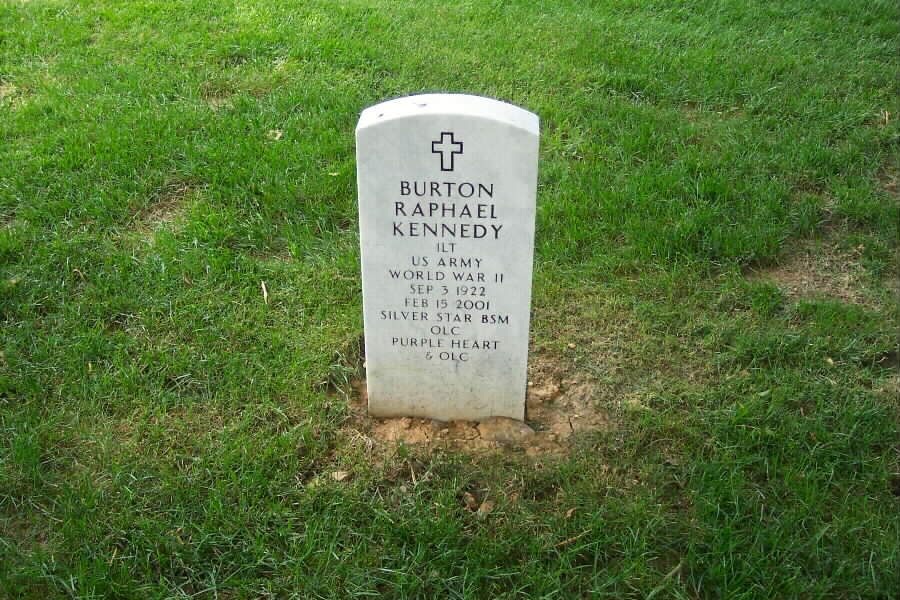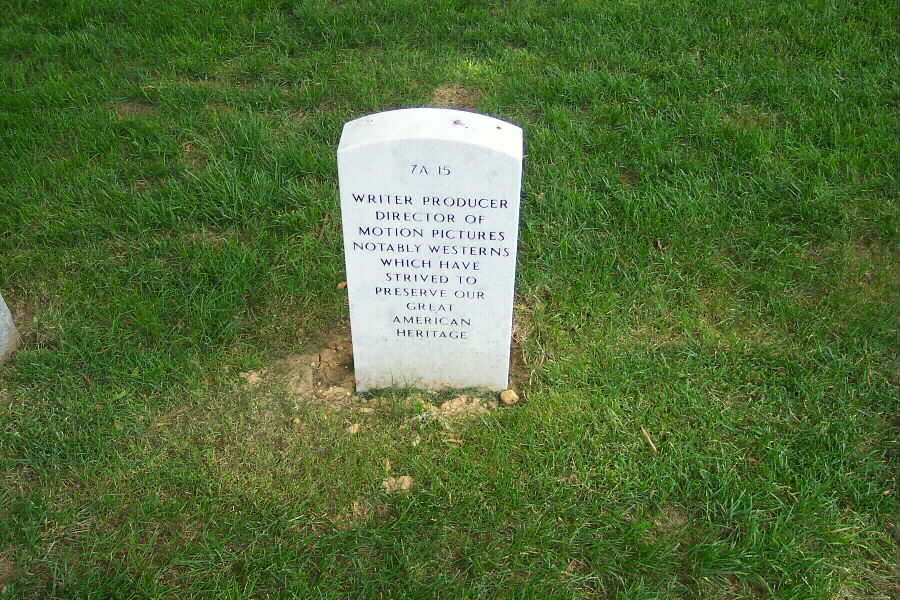From contemporary press reports:
Burt Kennedy, a writer-director of movie and TV westerns who worked with cowboy stars ranging from John Wayne to James Garner, died on February 15, 2001, at age 78, associates said.
Kennedy, who was born into a traveling stage act known as ”The Dancing Kennedys” and was once hired by Wayne to be a script writer, died of cancer at his home in the Los Angeles suburb of Sherman Oaks, said “Entertainment Tonight” film critic Leonard Maltin, a family friend.
During a career that ran from the late 1950s to the 1990s, Kennedy directed nearly two dozen western features, including ”The War Wagon” with Wayne and Kirk Douglas,” “The Rounders,” with Henry Fonda and Glenn Ford, “Support Your Local Sheriff,” with Garner and “Young Billy Young,” with Robert Mitchum.
He also wrote and directed for numerous television shows, including Western series “Lawman” and “The Virginian” the World War II series “Combat!” and later detective dramas “Simon and Simon” and “Magnum P.I.”
His last public appearance was last August at a Los Angeles screening of a restored version of his first produced screenplay, the 1956 film, “Seven Men from Now.” His final film, a 28-minute short titled “Comanche,” about the only cavalry horse to have survived the battle at Little Big Horn, was completed last year but has not been released, Maltin said.
Son Of Vaudeville Performers
A native of Muskegon, Michigan, Kennedy was the son of vaudeville performers who joined the family act at age five, remarking years later that he “was a has-been by the age of seven.” At the age of 20, he joined the Army and served in the Pacific theater of World War II, earning a Purple Heart and several other decorations for bravery.
Moving to California after the war, he studied acting under the G.I. Bill and found work writing for radio in 1948. He broke into the movie business by landing a writing contract with John Wayne’s film company, Batjac Productions, then based at Warner Bros. studios.
It was Wayne, as a producer, who brought Kennedy together with fellow cowboy star Randolph Scott and director Boetticher for “Seven Men from Now,” Kennedy’s first produced screenplay. He, Boetticher and Scott went on to collaborate on three more films — “The Tall T” (based on an Elmore Leonard story), “Ride Lonesome” and “Comanche Station.”
Kennedy made his film directorial debut with the 1961 non-western critical flop “The Canadians,” shifted his attention to TV and returned to the big screen in 1964 with ”Mail Order Bride,” starring Buddy Ebsen.
In 1990, he shared screenplay credits on the Clint Eastwood-directed adventure drama “White Hunter, Black Heart,” a movie adaptation of Peter Viertel’s 1953 novel based on his experiences during the filming of “The African Queen”
Kennedy is survived by two daughters and five grandchildren. He is to be buried with full military honors March 2, 2001, at Arlington National Cemetery outside Washington, D.C.
Hollywood Trail Boss buried at Arlington
Courtesy of the Pentagram
Burt Kennedy, famed screenwriter and director of several John Wayne films, was buried at Arlington National Cemetery, last week. Kennedy, 78, died February 15, 2001, from cancer.
While serving in the 1st Cavalry Division from 1942 to 1946, Kennedy was awarded a Silver Star, a Bronze Star, Purple Heart with Oak Leaf Cluster, an Asiatic-Pacific medal with four stars and a Philippine Liberation Medal with two stars.
“I knew him for over 15 years, and he never talked about his experiences in World War II,” said Jake Crawford. “He was too modest for that.”
As a member of the elite 1st Cavalry Division, Kennedy served under General of the Army Douglas MacArthur. He also served as an officer in H Troop of the 5th Cavalry Regiment of the First Cavalry Division.
The 5th Cavalry Regiment was famous because MacArthur’s father, who fought Geronimo in the old southwest, commanded it. Also, they were the only regiment named in the movie “MacArthur.” The 1st Cavalry Division (first in Manila, first in Tokyo) was General MacArthur’s “First Team,” always advancing, always victorious.
After his honorable discharge in 1953, Kennedy’s career in writing for radio led to an extended position as a screenwriter for Batjac Productions, which was owned by John Wayne. Kennedy had written, directed and/or produced over 75 films, including “Support Your Local Sheriff,” “The Rounders” and “The War Wagon.”
“I remember hearing stories of John Wayne, Henry Fonda, Frank Sinatra, and James Garner,” said Kennedy’s daughter Bridget. “He never forgot a name or a date.”
Kennedy has written the original screenplays of four classics that remain on many lists of the Top Ten Westerns ever made. He also published his autobiography, “Burt Kennedy-Hollywood Trail Boss,” in 1997.
“He was such a great story teller,” Crawford said. “And I think his work documents that.”
Budd Boetticher, who directed most of Kennedy’s earlier work called him the best Western screenwriter because he was “so carefully authentic” of his depictions of life in the Old West.
Kennedy’s last appearance was in August 2000 at UCLA’s James Bridges Theatre, where he and Boetticher spoke after a showing of their 1956 film, “Seven Men From Now.” The film was out of the public eye for several decades, and after its restoration by the UCLA Film and Television Archives, it was shown to great acclaim at the New York, London and Telluride Film Festivals.
“He told me right before he passed away, ‘Success is measured in your friends and a passion for your work,’ and I believe those words ring true,” said Bridget Kennedy. “As strong of a man as he was, as much as he commanded and directed other people,” she continued. “He had compassion for everyone he met.”
Stan Corliss, famed country singer and songwriter, dedicated “Every Cowboy Knows There is a God Above” in tribute of his friend.
“I thought the song was appropriate,” said Corliss. “It reflects his western roots and his strong belief in the mercy of God.”
Kennedy was an honorary lieutenant governor of Oklahoma, a sheriff of Dallas, a mayor of San Antonio and is recognized by the Michigan House of Representatives as a favorite son.
“Honor was the most important thing to Burt,” Crawford said. “He respected everybody he came in contact with.”
One can only assume that Kennedy was applying the life of a soldier to his words when he said, “I like the loner. I always thought that one secret of a good western is that the story’s problem is not the leading man’s problem. The leading man should be able to walk away at any point, but he chooses not to, and that’s what makes him a hero.”
KENNEDY, BURTON RAPHAEL
- 1LT US ARMY
- VETERAN SERVICE DATES: 05/23/1944 – 06/25/1946
- DATE OF BIRTH: 09/03/1922
- DATE OF DEATH: 02/15/2001
- DATE OF INTERMENT: 03/02/2001
- BURIED AT: SECTION 7A SITE 15

Michael Robert Patterson was born in Arlington and is the son of a former officer of the US Army. So it was no wonder that sooner or later his interests drew him to American history and especially to American military history. Many of his articles can be found on renowned portals like the New York Times, Washingtonpost or Wikipedia.
Reviewed by: Michael Howard

